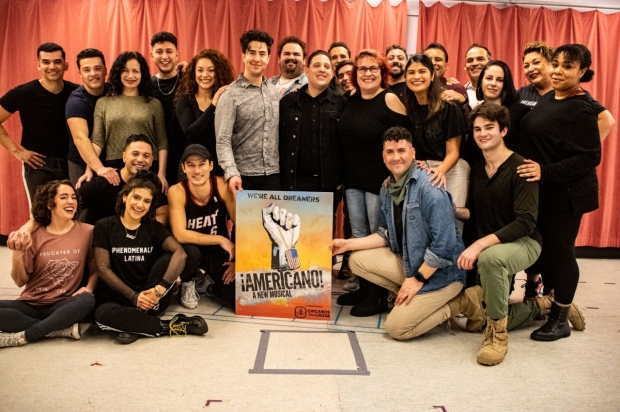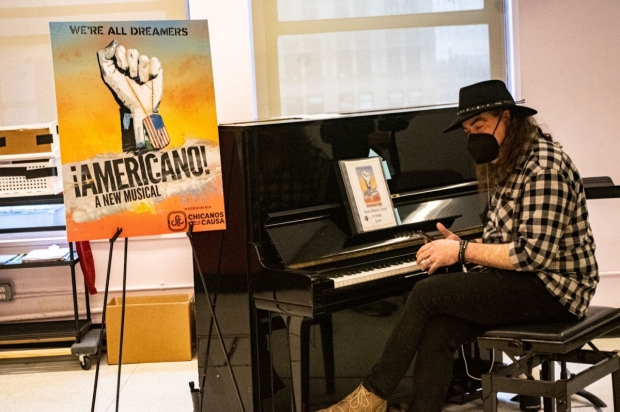Interview: The Emotional Core of Musical Worldbuilding With Carrie Rodriguez
Carrie Rodriguez is the composer of ”¡Americano!”, based on the life of Tony Valdovinos.
Musical-theater writers are dreamers looking to build worlds for themselves and the audience. New musicals take substantial amounts of energy and time to craft the emotional core, structural mantle, and spectacle crust. Conception to production could often take up to a decade.
With a songwriting career that spans two decades, Carrie Rodriguez steps into a relative yet new dream for herself. She is the composer of the new musical ¡Americano!, a story based on the life of Tony Valdovinos, a man who discovered he is an undocumented immigrant when trying to enlist for the Marines. Goombay, norteño, ranchera, reggaetón, and salsa flow in its musicality.
We recently spoke to Rodriguez about being a musical theater newcomer who's getting ready to give New York audiences a sound they've never heard, as previews begin at New World Stages on March 31.

(image provided by the production)
This conversation has been condensed and edited for clarity.
Could you share your experience of entering into musical writing?
I'm new to musical-theater writing. I generally wrote songs about my own personal experiences. This has been very different. Being a songwriter writing about my own experiences and then transforming that into writing about Tony and his family and their life has been an incredible journey.
Culturally, I'm in a Mexican American neighborhood. The diesel truck in the house next to me fires up at 4am in the summer because it gets so hot here. I'm taking my own experience of where I live in Austin, Texas, and imagining that we're in Phoenix and this is Tony's family and his father's firing up that diesel engine early in the morning to go to work and Tony's going with him. I drew a lot on watching Mexican American families around me. On a Saturday night, you might find 5-year-olds with sparklers in the yard with their grandmas and everyone all having a family party.
So, you've learned plenty about yourself that you didn't know before?
I did really grow as a songwriter to be able to speak in someone else's voice. It took a lot more research than I was used to. I've always been an organic songwriter. It's springing from an observation or an inspiration I certainly have. But in this case, I need to write about Tony's excitement to become a Marine, and about Marines and I don't know much about Marines. All of a sudden, I'm researching everything about Marine terminology: "Devil Dogs," "code of honor," "got your six." I had to learn about what day-to-day life is like. I never pictured myself writing a song like that, and it was great for my songwriting chops to be put to that challenge.

(© David Quang Pham)
What other non-theater artists did you also bring along to help develop the sound of your score?
When it was time to find an arranger, I called someone who I've looked up to for years. We share the same booking agent, his band is called Orkesta Mendoza, and his name is Sergio Mendoza. He writes in the Mambo-Colombia-type music and has a big band that plays all over the world. He also was a member of Calexico, one of my favorite bands. I called and said: "Hey, have you ever arranged music for a musical before?" He's like, "No." And I said, "Well yeah, I've never written one either, but I did." And he was excited. It's an all-new territory. It has brought new challenges, but his sound is so fresh and it's a unique voice to musical-theater.
The sound of the band for this show is so rocking. You cannot keep your butt still in the seats. It makes you want to dance the whole time. It's beautiful arranging. The instrumentation is beautiful. That's going to be a new sound especially for New York.
Jonathan Ivie informed me of the last-minute tempo changes to "Come Join the Marines." What theatrical aspects did you retool or redo during the lockdown?
We were lucky we got to do the show right before the lockdown. We had a three-week run in Phoenix. There were things we wanted to change after that. And we did change the storyline in the second act. I ended up writing two new songs, which I didn't expect to, but they turned out to be some of my favorites. One is called "Familia." It speaks to taking on a family when you're away from your home country and you come to a new country and your closest friends become your familia. Then "For Today." That comes at the end of Act 2. It's very powerful about letting hope replace fear and letting your hope lead, instead of having fear stop you. I'm grateful we had those two years to tweak and write a couple new songs.
What advice would you give an emerging musical-theater writer?
My biggest piece of advice is to go back to that emotional content of the song. There is so much cerebral that goes into musical-theater songwriting. There has to be because it's part of this big show. They're all these different elements. But at the same time, the most important thing about songwriting and about songs, is that you're moving people, you're giving them an emotional push to really feel. Does this song have the thing that is like making us really feel in that moment, whether it's about subatomic particles or DACA rules? The crafting and figuring out the details and how it fit into the story, all that comes later. That emotional core is really important.

(© David Quang Pham)









